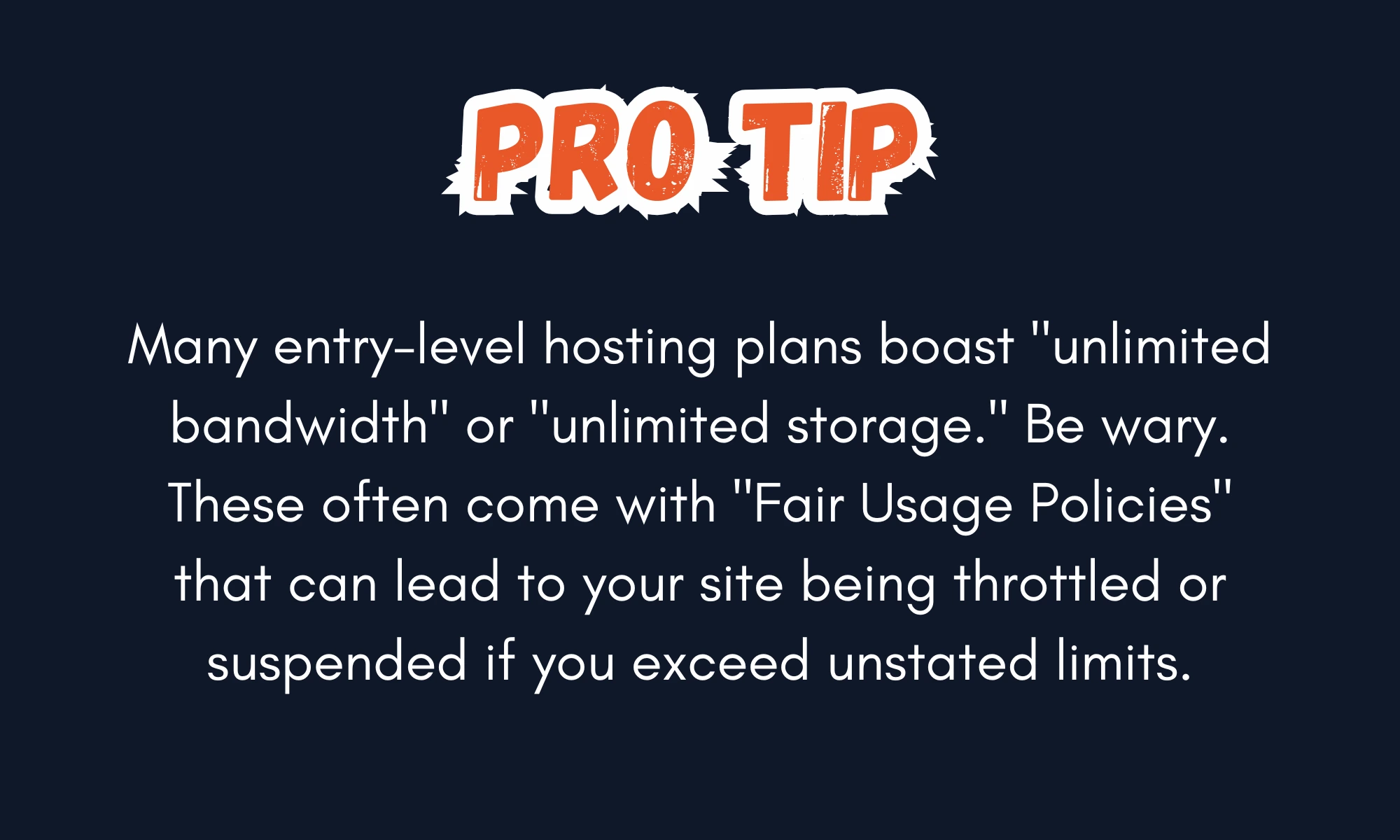Essential Factors for Evaluating and Choosing Your Web Hosting Provider

Every successful online presence, whether it's a bustling e-commerce store, a vibrant blog, or a slick portfolio, is built on a fundamental, often-overlooked component: web hosting. It's the digital land your website resides on, and the quality of that land directly impacts its performance, security, and ultimately, its success. Yet, many rush into this crucial decision, only realising the gravity of a poor choice when faced with frustrating downtime, sluggish speeds, or even devastating security breaches.
At Appear Online, we understand that your web host is more than just a service provider; it’s a critical partner in your online journey. This guide will walk you through everything you need to know about selecting the right hosting provider, from understanding the different types of hosting available to assessing key performance and security factors, avoiding common pitfalls, and ensuring your website has the robust foundation it deserves.

Demystifying Web Hosting: The Core Foundation of Your Online Presence
Before diving into selection criteria, it's essential to grasp what web hosting is and the various forms it takes.
What is Web Hosting and Why Do You Need It?
Think of your website as a house. It has all your carefully designed rooms, furniture, and amenities (your content, images, and code). For anyone to visit your house, it needs to be built on a piece of land. In the digital world, web hosting is that "land." It’s the service that provides the space on a powerful server where all your website’s files, databases, and code are stored, making them accessible to anyone with an internet connection. Without hosting, your website simply wouldn't exist online.
Common Types of Web Hosting Explained
The web hosting landscape offers a variety of options, each suited to different needs and budgets. Understanding them is your first step:
- Shared Hosting: This is the most common and often the cheapest option, ideal for beginners, small businesses, or personal blogs with low traffic. With shared hosting, your website shares server resources (like CPU, RAM, and disk space) with many other websites. It's like living in an apartment building – you share the amenities with other tenants.
- VPS Hosting (Virtual Private Server): A significant step up from shared hosting, VPS gives you a virtual partition on a physical server. While you still share the server with others, your section is dedicated, meaning you have guaranteed resources and more control. It's akin to having your own flat within an apartment building.
- Dedicated Hosting: This provides you with an entire physical server exclusively for your website or applications. It offers maximum performance, security, and control, but it's also the most expensive option, typically reserved for large, high-traffic websites, e-commerce giants, or complex web applications. This is like owning your own detached house.
- Cloud Hosting: This modern solution leverages a network of interconnected servers. Your website's data is distributed across multiple servers, meaning that if one server fails, another can seamlessly take over. Cloud hosting offers exceptional scalability and flexibility, allowing you to pay only for the resources you use, making it ideal for sites with fluctuating traffic.
- Managed WordPress Hosting: Specifically optimised for WordPress websites, this type of hosting handles many technical aspects like updates, security, and backups for you. While generally more premium in price, it offers a hands-off approach, allowing WordPress users to focus solely on content creation and business growth. If relevant to your agency, some providers also offer Reseller Hosting, allowing you to host client websites under your own brand.
Key Hosting Terminology
To make an informed decision, you'll encounter some key terms:
- Uptime: This is the percentage of time your server is operational and your website is accessible. You should always aim for a provider guaranteeing 99.9% uptime or higher, as anything less can significantly impact your website's availability.
- Bandwidth: This refers to the amount of data your website can transfer to and from visitors over a given period. Higher traffic and more media-rich content require more bandwidth.
- Storage: This is the amount of disk space allocated for your website's files, databases, emails, and other assets.
- Domains/Subdomains: Your hosting plan will specify how many primary domains and subdomains you can host.
- Control Panel (cPanel/Plesk): This is the graphical user interface (GUI) provided by your host that allows you to manage your website, databases, email accounts, and other hosting settings.
.webp)
Essential Factors for Evaluating a Hosting Provider
With the basics covered, let's dive into the critical areas you must scrutinise when comparing potential hosting providers. Overlooking any of these can lead to long-term headaches.
Critical Considerations When Choosing Your Web Hosting Partner
- Performance and Speed: Your website's loading speed is paramount. It impacts user experience, bounce rates, and even your search engine rankings (SEO). Ask about server speed and ensure the provider uses SSD (Solid State Drives) for faster data access, as these significantly outperform traditional HDDs. Look for CDN (Content Delivery Network) integration or support, as a CDN caches your content across servers worldwide, delivering it quickly to users regardless of their geographical location. Crucially, choose a provider with server locations close to your primary target audience. If your customers are in the UK, a server in London will generally outperform one in New York for them.
- Reliability and Uptime Guarantees: Your website needs to be online, always. As mentioned, 99.9% uptime should be the absolute minimum standard. Reputable hosts will offer a Service Level Agreement (SLA), which is a formal contract detailing their uptime guarantees and outlining any compensation if these guarantees are not met. Inquire about their redundancy measures and failover systems; these ensure that if one server component fails, another immediately takes its place, preventing downtime.
- Security Features: Website security is non-negotiable. Your host should provide robust measures to protect your data and your visitors. This includes offering free SSL Certificates (which enable HTTPS and are vital for SEO and trust), DDoS Protection to guard against overwhelming traffic attacks, and strong firewalls to block unauthorised access to servers. Regular malware scanning and removal are also crucial, along with proactive monitoring for vulnerabilities. Most importantly, your host should offer regular, automated backups with easy restoration options, ensuring you can quickly recover your site in case of any data loss or breach.
- Scalability and Flexibility: Your website's needs will likely grow over time, and your hosting should be able to grow with it. Ensure the provider offers clear and seamless options to upgrade or downgrade plans as your traffic fluctuates or your requirements change. Look for flexibility in resource allocation (CPU, RAM) and a straightforward migration process between different hosting types if you anticipate needing to move from shared to VPS or cloud hosting in the future.
- Customer Support: When things go wrong – and inevitably, they sometimes will – prompt, knowledgeable support is invaluable. Look for a provider offering 24/7/365 support via multiple channels like phone, live chat, and a ticket system. Test their response times before committing, perhaps by sending a pre-sales query. Read reviews specifically focusing on the quality and helpfulness of their staff; you want experts who can genuinely assist, not just read from a script.
- Pricing and Value for Money: While price shouldn't be the sole deciding factor, it's obviously important. Be wary of overly cheap introductory offers that often come with significantly higher renewal rates after the first term. Always clarify the actual renewal cost upfront. Watch out for hidden fees for things like domain renewal, SSL certificates (if not included), or additional services. Understand exactly what's included in the package – email accounts, databases, bandwidth limits, and whether any "unlimited" claims come with fair usage policies. The goal is to find a balance between cost, features, and reliability.
The Selection Process: From Assessment to Migration
Now that you understand the crucial evaluation factors, let's outline a practical, step-by-step approach to selecting your ideal web host.
Your Step-by-Step Guide to Choosing and Migrating Hosting
- Assess Your Website's Current and Future Needs: Before you even start looking, clearly define what your website needs. Is it a simple personal blog, a resource-heavy e-commerce store, or a dynamic web application? How much traffic do you currently receive, and how much do you expect it to grow over the next one to two years? Do you have specific technical requirements, such as a particular programming language (e.g., PHP, Python) or database type (e.g., MySQL)? Finally, establish your budget constraints for both initial setup and ongoing costs.
- Research and Shortlist Providers: Based on your needs, begin your research. Read independent reviews from reputable sources, not just testimonials on a host's own site. Compare features across several providers that seem to fit your criteria. Look for hosts with a strong reputation for reliability, excellent customer service, and, if applicable, those who specialise in the platform your website uses (e.g., dedicated WordPress hosts).
- Test Drive (Where Possible): Many reputable hosting providers offer money-back guarantees. Utilise these. Sign up, install a basic version of your site, and test their performance and support response times. If a trial period is available, take advantage of it to get a real feel for their service.
- Understand the Service Level Agreement (SLA): Always read the small print. The SLA is your contract with the host. It will detail their guaranteed uptime and the compensation you receive if they fail to meet it. It also clarifies responsibilities – what the host is responsible for versus what falls to you.
- The Migration Process: If you're moving an existing website, understand the migration process. Does the new provider offer free migration assistance? Many reputable hosts do, taking the technical burden off your shoulders. If not, are there clear guides or reputable third-party services you can use? Plan any downtime carefully if manual migration is needed, ideally scheduling it during off-peak hours.
.webp)
Navigating the Pitfalls: Common Hosting Selection Mistakes
Even with a clear understanding, it's easy to stumble into common traps. Being aware of these will save you considerable time, money, and frustration.
Navigating the Pitfalls: Common Hosting Selection Mistakes
- Falling for the Cheapest Deal: While budget-friendly options exist, opting for the absolute cheapest hosting often leads to poor performance, limited resources, and unreliable support. This can be a false economy, costing you more in lost traffic, frustrated users, and recovery efforts down the line. Remember to always check the renewal rates, as they are often significantly higher than the initial promotional price.
- Overlooking Scalability: A common mistake is choosing a plan that's just enough for today, without considering future growth. Your website will hopefully attract more visitors, and if your hosting can't scale easily, you'll face costly, urgent upgrades or even forced migrations, leading to potential downtime and stress. Always ensure your chosen host offers a clear and straightforward upgrade path.
- Neglecting Customer Support: Many only realise their host's support is inadequate when a critical issue arises – and that's often too late. Don't assume. Look for a provider with 24/7 availability and genuinely knowledgeable staff who can troubleshoot complex problems, not just provide generic answers.
- Ignoring Backup Policies: Never assume your host's automatic backups are sufficient or that their restoration process is fool proof. Understand their backup policies – how often are they taken, how long are they stored, and how easy is it to restore? It's always wise to also maintain your own independent backups for ultimate peace of mind.
- Believing "Unlimited" Claims: When a host promises "unlimited bandwidth" or "unlimited storage," proceed with caution. These often come with Fair Usage Policies hidden in the terms and conditions, meaning there are limits that, if exceeded, could lead to throttling or forced upgrades. Always read the fine print.
.webp)
Conclusion
Selecting the right web hosting provider is a foundational decision that profoundly impacts your website's speed, security, and potential for growth. It's an investment in your online future, not merely a recurring cost. By carefully assessing your website's unique needs, thoroughly evaluating providers based on critical factors like performance, security, and support, and steering clear of common pitfalls, you can ensure your digital presence is built on a robust, reliable, and scalable foundation.
Take the time to make an informed choice. Your website's success and your peace of mind depend on it.
References:
https://aws.amazon.com/what-is/ssl-certificate/
https://blog.hubspot.com/website/what-is-gui
https://cloud.google.com/learn/what-is-cloud-hosting
https://www.cloudflare.com/learning/cdn/what-is-a-cdn/
https://www.coursera.org/articles/sla
https://www.godaddy.com/hosting/vps-hosting
https://www.hostgator.com/blog/what-is-shared-hosting/
https://www.ibm.com/think/topics/ddos-protection
https://www.ibm.com/think/topics/solid-state-drives
https://www.inmotionhosting.com/blog/what-is-reseller-hosting/
.avif)


.webp)





